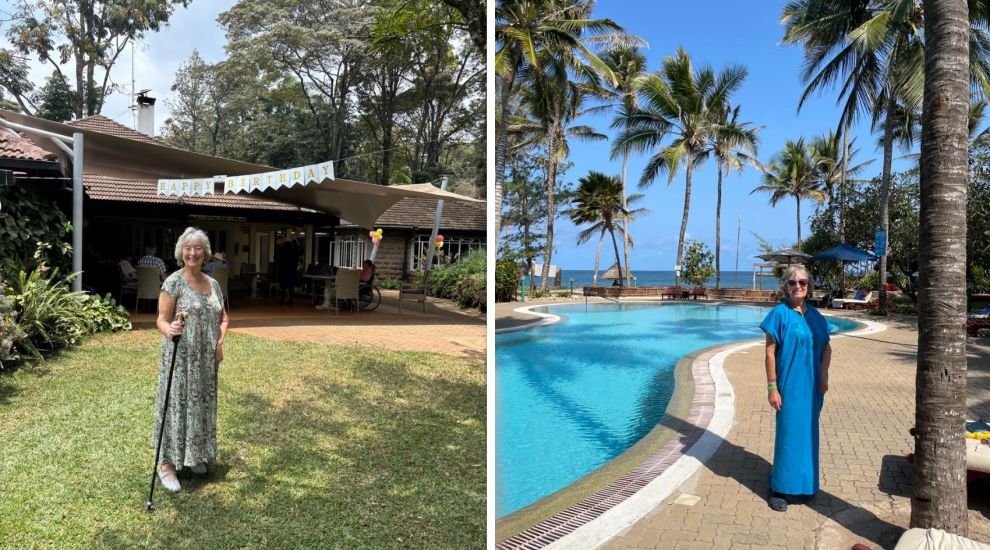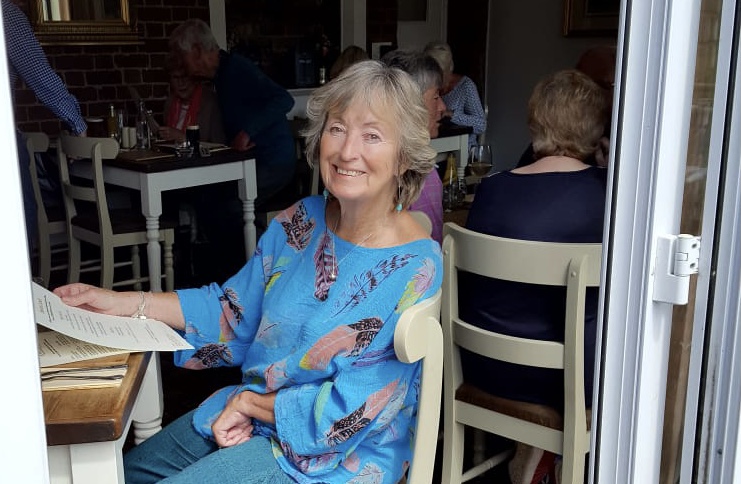


A stroke survivor has opened up about her decision to leave Jersey and move to Kenya after realising she couldn't afford the care she would need without having to sell her long-term island home.
Pam Evans, a former teacher who lived in Jersey for 45 years and suffered a brain haemorrhage in 2004, left the island to live in a Kenyan retirement community last year.
Her decision came a year after her husband's passing in the East African country during what was meant to be a golden wedding anniversary celebration.
Having taught English there in the 1970s, the country held a special place in the couple's hearts.
"It's such a fabulous place with beautiful people, wonderful climates, and amazing wildlife," Pam said. "We never really left. We kept coming back for holidays and to see friends."
But the decision wasn't purely emotional - Pam's need for additional support following a stroke 20 years ago that left her with partial paralysis and the rising cost of living in Jersey left her feeling unable to stay in the island she called home.

Pictured: Former teacher Pam Evans had a stroke in 2004 on her 56th birthday.
"I was left on my own with both my daughters having families and very demanding jobs. It was the thought of the future that frightened me, that this stroke isn't going to get any easier," she told Express.
Islanders utility bills have continually crept up in recent years, and the latest stats show that pensioners have felt the brunt more than many working-age islanders.
At the end of last year, it was confirmed that electricity prices would be going up by 7.5% due to "turmoil" in international markets – 2.5% above the latest inflation figure, adding around £2 to the existing weekly electricity bill of around £27 for the average Jersey household.
"I don't like the cold at all. It's quite painful after a stroke, and the electricity was getting to a price that was almost impossible," Pam explained.
"As I got older, I couldn't see how I could manage the care I need without having to sell my home, which I really didn't want to do."
Beyond utility bills, the cost of care has also risen. In Jersey, home care is up to around £40 per hour. Following a £70,000 review published in October, Ministers are considering a move to what has been described as a "more common-sense approach" when it comes to doling out long-term care benefit by introducing a standard hourly rate.
However, any potential changes on the horizon come too late for Pam.
Picutred: Pam moved to Kenya after her husband's death and her own health challenges made living in Jersey difficult.
"I couldn't see how I was going to manage financially and physically in the future, paying for the care I would need as well as my heating and everything else."
Recently published data has revealed that a third of Jersey households struggled to meet the cost of housing last year, while a survey from 2022 showed that one in five islanders had minimised their use of heating due to money worries.
During her time in Jersey, Pam set up an independent charity called DriveAbility to help those with physical disabilities, older people, or neurodiverse individuals to drive and maintain an independent lifestyle.
She also introduced the Stroke Association to Jersey and worked with the Jubilee Sailing Trust, which operated Tenacious, the world's only tall ship capable of accommodating a mixed-ability crew. The Trust, which has enabled over 2,000 islanders to sail, recently announced its closure due to financial difficulties.
While the decision to move wasn't necessarily an easy one, Pam is full of positivity about it, and has praised the country for its supportive environment and people.
Picutred: Pam now lives in a supportive retirement community in Kenya, where she receives affordable care and enjoys a sense of community.
"A friend had always said to me, 'If you ever need care, come to Kenya.'"
Pam did just that and says she is content in her retirement community, where she is enjoying a more affordable and supportive lifestyle.
Tropical gardens surround her two-bedroom cottage, and her living arrangements include four hours of daily help, a weekly gardener, all meals, and utilities.
Picutred: Pam is concerned about having to pay full taxes in Jersey without access to healthcare benefits.
"My rent here is a fraction of what I would pay in Jersey for any care," she said. "There's always somebody I can call if I want company, or I can have my privacy if I wish. It's not a nursing home—it's a residential community in a beautiful parkland."
The community houses around 32 residents, predominantly white Kenyans. "Their lives are absolutely fascinating. Most of them have lived, if not all over Africa, all over the world," Pam said.
Despite her new life in Kenya, Pam retains close ties to Jersey, where her daughters and grandchildren live.
She visits the island during the summer but has raised concerns about the lack of healthcare access for residents who have been away for more than three months.
"I've lived in Jersey for 45 years and have permanent residency, but I can't access healthcare when I return," she said. "I don't mind paying tax if I'm eligible for healthcare when I come back, but it doesn't seem right to pay without receiving anything in return."
Pam continues to pay full tax on her pension, which is deposited into her Jersey account. Yet, she is ineligible for local healthcare, a situation she finds deeply unfair.
"It doesn't seem quite right," she added.
Stroke survivors and families make plea for Samarès Ward reopening
Comments
Comments on this story express the views of the commentator only, not Bailiwick Publishing. We are unable to guarantee the accuracy of any of those comments.